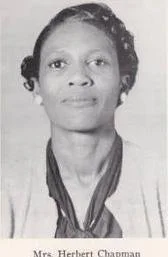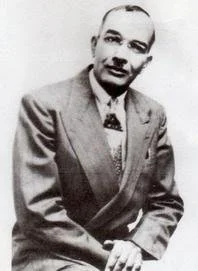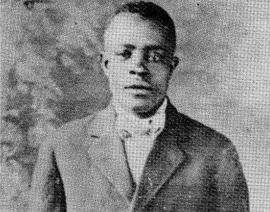Three Bonham Blacks Talk About Their Lives
Interviews with Mrs. Nobel Chapman, Emmitt Elliott and Willie Ross by Charles Lovell and James Conrad on May 7, 1981
Mrs. Noble Chapman
I moved to Bonham at the age of five, and I recall standing up on a box to wash dishes then. By the time I was 12, I could iron, cook and wash dishes.
I remember everything everything had to be just right while I was helping my grandmother work in a white household. I started washing the white family's dishes when I was about 8 years old. Sometime I would have to miss a day of school to go iron in the white house. On a normal day I would leave school at 4 p.m. and go wash dishes. In those days there was no natural gas either so I had to bring i four large scuttles of coal every day and pour it from the top into the stove.
I remember picking cotton. When we picked cotton, the cotton was put in a long duck sack. Sometimes I would pick 300 lbs. or more of cotton a day. I would stoop down and pick the cotton and put it into a sack. Sometimes the sack we carried weighed over 90 lbs. When the sack was full of cotton, we would take it down to have it weighed and would get paid according to weight. Then the cotton would be emptied into a wagon until the wagon was filled. We got paid for the cotton by the 100 lbs. We were paid $1.50 to $1.75 per 100 lb. sack.
I got my inspiration to become a teacher from Mrs. Viola Johnson of the Bonham Colored School, who taught the third grade, and I decided at an early age that I wanted to be like Mrs. Johnson. Later, Mrs. Bennett, my 6th grade teacher, helped me make up my mind.
After my mother died, by father married his second wife and they had three children. By the time I'd finished Washington High, my stepmother had died and my father married again. With his third wife he had four children.
At the time I graduated from high school I told my father that I wanted to continue with school. My father told me if I would come down to Hickory Grove and pick cotton he would help me go to college. As it turned out, I didn't get to go to college because father didn't make enough bales of cotton. One of my step sisters got to go to college around then and my not being able to go hurt me deeply, and I cried and I cried and told my grandmother that my father didn't care for me because he didn't send me to college.
Soon after this I got married. I met a young man, Herbert Silas Chapman, and he wanted to get married. I told him I did not want to get married because I wanted to get my college degree. He said that if I married him he would help me go to college. I wasn't sure that he would - but he did exactly as he said he would. When we were married, my husband worked at the ice factory. I washed, picked cotton, cooked and put money back to go to college.
A friend told me, "Noble, you are so determined to go to college that you should try to get a teaching certificate from the state of Texas." She said that I could take the test in Bonham at the courthouse, and they would send the scores to Austin to see if I passed. If I passed the exam, I could get a certificate to teach school for one year. I ended up passing the exam the first time I took it, and I taught school for one year. At the end of the year I had to take the exam again for the temporary certification to teach. I did that for two or three years before I was able to go to school at Prairie View S&M during the summers. I finally graduated from Prairie View A&M in 1948.
When I was teaching, I was paid $40 per month. We didn't have a car and it cost me $10 per month to get a ride to work every day. Not until the Gilmer-Aikens Act of 1949 did we get a respectable salary. The white trustees had control of the school and they gave us what they felt like. The negro trustees never signed anything; the white ones did everything.
I live through it. I worked at the Ravenna School for 18 years and at Washington High School for 20 years. At Washington I was making about 4100 per month. There were black principals there, but it was the white trustees and the white school boards who made all the decisions.
I worked for 38 years teaching homemaking. I was on the go all the time, visiting homes and overseeing different projects. And I would carry my students to meeting and conventions and so on.
In Bonham partial integration was achieved in 1965 while full integration came in 1966. I quit teaching after this.
I was determined that I was going to become a teacher. It was all right making it the hard way. When you work for something, you get a sense of value. I can't understand how some college kids today can miss classes, and not study, and this is just throwing away money. I am grateful to the Lord that I got where I am. Teaching is a rewarding career, and I love kids and I always have. Last year I got ten mother's day cards from some of my ex-students, and they have grown families of their own.
My work was honorable, and I did as well as I knew how. I would do my work so that no one could come and improve upon it. I recommend that when doing work, whether that work be cooking, washing, ironing, babysitting, or teaching, do that work well.
Emmitt Elliott
My papa was 10 years old when he was freed from slavery. He was brought to Texas as a slave by Dr. Martin. Just prior to the Civil War, Dr. Martin and his whole family came to Texas fro Kentucky to start practicing medicine.
My father was a farmer and was in the tobacco business, and he stayed on the farm several years. Later my papa used to work at the tobacco factory in Bonham. I wish I could be as good a man as my father.
My two brothers served in World War I, but I did not go overseas. I cooked practically all of my life. I learned to cook, picking it up on my own, and I began working at an early age. Because my baby sister was spoiled, I had to do her chores and mine too and that's how I learned to cook.
I first started cooking at 19 in a private home. I worked as a cook there for seven years, across from the Trinity Church. Later I worked on the river at the Club House for 6 years. I worked for a boarding house here in Bonham before I moved to Dallas where I lived for 13 years.
In the private home I would cook three meals a day: breakfast, dinner, and supper; never had the weekends off; and I had no help in the kitchen either. I did all the cooking and also some cleaning. I lived about five blocks from where I worked, and I would walk there everyday. It was quite common then to live at home and go work out. Many women of the neighborhood would go out and work for white homes, cooking, washing and ironing, but there were not many private homes where men were cooks. I didn't want to work in a restaurant though.
I planned all the meals. They would let me have my way. The groceries would be delivered.
Now, I live next door to the house that I was born in 81 years ago. I own it. That's my summer resort, though it's ragged as a hotel mop. I love that place.
I have six children, ten grandchildren and two great grandchildren. Four of my sons live in Dallas, while two live in California.
On Saturdays, I love to cook something special. Last Saturday I made a chocolate cake. One of my favorite recipes is a Kentucky pie. The recipe is: Cream half a cup of butter with two cups of sugar. Then take four egg yolks and stir in one cup of buttermilk. Add one teaspoon of cinnamon and a dash of cloves and all spice and half a teaspoon of nutmeg. Add one cup of soft, moist raisins and a half cup nuts. Bake in an unbaked pie shell and cover with meringue.
Willie Ross
In 1887, our family lived three miles southwest of Bonham and had 35 acres of ground. We had three mules and a horse, and came to town in a wagon, cutting through the roads south of Bonham to get in to town. There were not houses out in the country then.
For breakfast we would eat oatmeal of cream of wheat. For supper we would eat beans, corn, or rice. In the summertime we had molasses, beacon and coffee.
For recreation we would fish or hunt. Sometimes we would gather English Walnuts, Hickory Nuts and Wild Grapes. We would go and camp at night and fish and take a skillet with grease to cook up the catch.
After World War I there used to be colored schools and white schools. When I went there, there was just three teachers for 100 students. I went to the 7th grade - colored schools then just went to the ninth grade.
I never did go to college though. The church wanted to send me, but I wanted to work. When I was eighteen years old, I started working on the railroad laying down the track. There I made $1.15 a day; $28 a month was the highest you could make. We would take the company train to Paris where we could buy groceries from the railroad store on credit. They would deduct the money then from our pay checks. You could take the nine o'clock morning train there and the nine o'clock train at night back to Bonham.
Segregation meant that white and colored couldn't mix. There were restaurants where a black man could work, but they couldn't go there and eat. In the movies the whites would sit downstairs and the colored upstairs. At the courthouse there were two wells, separate for the races. We would attend an all black church as well; then there was no racial mixing in the churches.
I can remember Roberta Dodd, the famous black opera singer, singing in the opera house here. She sang there many a night. The opera house - anyone could go there who had money. It wasn't segregated. The blacks had to sit in the balcony though.
Dating was different then. When nighttime came, we had better be home. We used a horse and buggy then to carry a girl to church. I married a girl who was 14 when I was 20. We were raised up together and went to Sunday School together. The Reverend Phillips married us at her mother's house.
I was 25 before I knew anything about a car. That was when I worked in Dallas. The first car I ever saw was a two seated red car. I worked in Dallas for 15 years for the Neuhoffs, who owned a meat packing firm.
Later, when I moved back to Bonham, I did yardwork. I worked there doing housework and yard work until 1954. I would make $40 o $50 a week mowing lawns. I was the best yardman in Bonham.
I will be 94 in September. I am the oldest black in Bonham. My dad lived to be 115 and my momma to 95. I been living in the same house since 1918.
The best time of life is right now, I'm just sitting.


